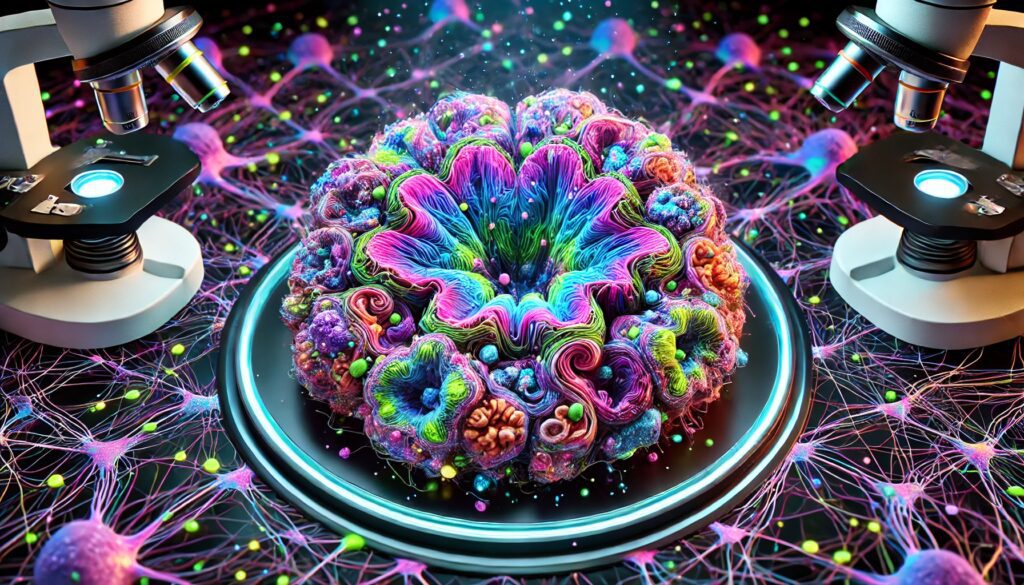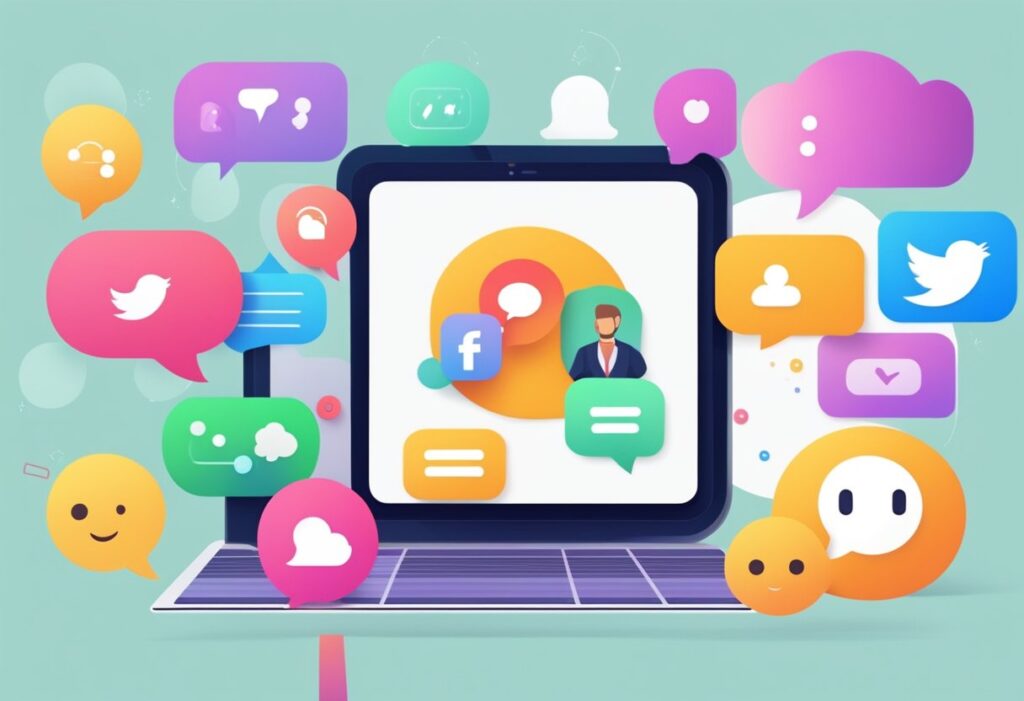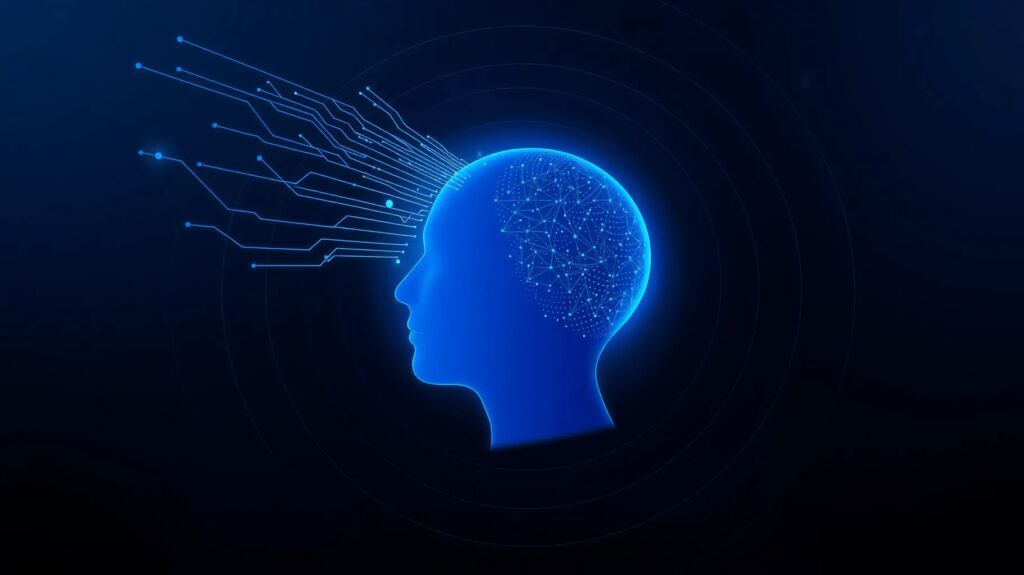The text discusses the potential impact of artificial intelligence on religion, exploring the idea of using technology to improve spirituality and help people do good things. It raises concerns about AI replacing human interaction in religious practices, with interviewees expressing the belief that AI will never replace a rabbi because it lacks a soul.
AI Fundamentals in Religious Contexts
As you navigate the intersection of technology and spirituality, consider how AI is redefining the religious landscape.
This section unpacks the basics of AI and its profound dialogue with theology.
Definition and Classification of AI
Artificial Intelligence (AI)—a feat of human ingenuity—is a technology designed to simulate human intelligence. Here’s a snapshot to clarify this complex field:
- Narrow AI (ANI): Designed for specific tasks, Narrow AI is currently the most widespread form in use.
- General AI (AGI): This type aims to understand and learn any intellectual task that a human can.
- Superintelligent AI: A hypothetical AI that surpasses human intelligence and capability.
In essence, each classification marks a step on the evolutionary ladder of AI technology.
Bear in mind, the leap from ANI to AGI represents a monumental shift not only in capability but also in ethical considerations, especially within religious contexts.
The Interplay of AI and Theology
The interweave of AI and theology sparks a debate that centers on existential questions.
For example, the possibility of AGI aligns closely with theological discussions around what it means to be human.
Let’s unpack this:
- Humanity vs. Technology: Debates are intensifying around whether AI can possess soul-like qualities or spirituality.
- Robots and Sacred Spaces: With AI-driven robots capable of processing data and performing tasks, questions arise about their place in religious ceremonies and practices.
A critical eye reveals that AI poses challenges to traditional theological views, urging scholars to rethink the role of technology in the sacred domain.
While AI can significantly augment human experiences—including religious ones—it prompts a necessary examination of the boundaries between the computer science marvel that is AI and the age-old tenets of various faiths.
Religious Interpretations of AI
The speaker’s talk, “Artificial Intelligence and Religion,” explores the historical connections between machines and religion, as well as the romantic visions of machines automating religious practices and the influence of cybernetics on religion
As you explore the intersection of AI and religion, discover how faith shapes the AI narrative and the theological implications of technological deities.
AI and the Concept of Deity
Your perceptions of the divine are evolving, with AI challenging traditional views.
Within various faiths, AI ignites debates about its role and status among believers.
Scholars question AI’s potential to embody characteristics often ascribed to deities, such as omniscience and omnipresence. Meanwhile, some argue that AI, while powerful, cannot encompass spirituality or divine essence.
In Christianity, discussions focus around AI’s alignment with God’s purpose and human morality.
For instance, Christianity considers humans as made in the image of God, a key doctrine shaping its response to AI’s ascendancy.
Unlike humans, AI lacks divine breath, making its elevation to deity status a contentious point. In Catholicism, leaders emphasize moral considerations and the duty of stewardship over technology.
Scriptural References and AI Narratives
Navigating the complex narratives of AI, you encounter philosophical ponderings rooted in scriptural texts.
Scholars correlate AI’s narrative with non-Pauline glimpses of the future and the Pauline call for discernment.
A profound example resides within the New Testament, where themes of knowledge and wisdom resonate strongly with AI’s attributes.
In Judaism, AI enters discussions surrounding Talmudic interpretations, prompting questions about AI’s role in understanding ancient texts.
Similarly, Islamic thought reflects on AI’s implications for theological teachings and daily worship, foregrounding the importance of intent behind actions, a core doctrine within Islam.
Religious leaders incorporate AI discussions into sermons, leveraging Gospel principles to address ethical AI deployment.
Your sacred texts become a lens through which AI’s cultural influence is analyzed, ensuring faith remains integral in a rapidly advancing technological world.
Ethical and Philosophical Dimensions

Engaging with artificial intelligence (AI) in the context of religion raises profound ethical and philosophical questions.
You’ll grapple with the intersection of technology and spirituality, considering the impact on your beliefs and practices.
AI Ethics in Religious Practices
Exploring Responsible Integration: Embracing AI in religious contexts requires careful consideration of how technology aligns with your ethical compass.
The question of whether AI aligns with the image of God becomes central.
As AI systems take on roles in religious life, the necessity for guidelines that respect human dignity and religious values becomes paramount, particularly in Christian religious settings.
Safeguarding Privacy and Identity: With AI comes the potential for infringement on privacy.
It’s crucial for you to ensure that AI respects the confidentiality of personal spiritual experiences and data. The metaphysical aspect of religion—such as the concept of the soul—must remain intact and unquantifiable by artificial entities.
Free Will and Decision-Making in AI
Understanding Autonomy and Accountability: When AI systems make decisions that affect religious dynamics, it begs the inquiry into the nature of free will—a cornerstone of many philosophical and religious teachings.
How can AI influence human decision-making without compromising the integrity of personal choice?
It’s essential for AI to operate within a framework of accountability, under human oversight.
Balancing Risks and Metaphysical Integrity: AI’s potential to aid or undermine the meaning of religious experiences is a metaphysical tightrope.
You must weigh the benefits against the existential risks to humanity’s spiritual essence.
The notion of free will intersects with AI’s capabilities in decision-making, pushing for a deeper understanding of where human responsibility ends and AI’s begins.
Technological Integration in Religion

As technology advances, religious practices are transforming. Now, you’ll witness robots and AI significantly altering how you practice faith and pursue religious education.
Robotics in Religious Rites and Rituals
Intriguingly, robots are now assisting in religious ceremonies.
In some temples, robot priests lead prayers and chant mantras, providing a consistent and tireless spiritual service.
Imagine a robot delivering a sermon with perfect recall of religious texts, powered by advanced data algorithms.
These robotics initiatives often emerge from tech hubs like Silicon Valley, leveraging the latest in machine-learning to adapt to various religious traditions.
AI in Religious Education and Study
Your religious education could soon be tailored personally to you through AI-powered tutoring systems.
Such systems analyze vast amounts of data to curate educational content, fitting your learning pace and style.
Open source technology allows for communal contributions to the educational material, enriching the study experience.
In essence, faith and technology converge, creating a new dimension of worship and theological understanding through technology.
Impact of AI on Beliefs and Practices

Artificial Intelligence (AI) is revolutionizing the religious landscape, altering how you practice and perceive faith.
Changing Dynamics in Religious Communities
AI is reshaping religious practices, creating virtual congregations where humans and robots may soon worship side by side.
Imagine attending services led by Emma, a humanoid robot capable of delivering sermons or even guiding meditation.
Christians, Muslims, Buddhists, and the nonreligious are finding innovative ways to integrate AI into their spiritual lives, whether it’s through AI-powered apps that help learn religious texts or algorithms that customize spiritual experiences.
Artificial Intelligence as Religious Entities
The concept of AI as a divine force is no longer just science fiction.
Anthony Levandowski’s Way of the Future church worships the potential of a singularity, where AI surpasses human intelligence and takes on a godhead.
Beliefs are evolving with the notion that AI can exhibit divine attributes, such as omnipresence and creativity, redefining the act of faith in the process.
Could an AI have followers who see it as a religious entity? This is no longer a hypothetical question, but a contemporary issue to grapple with.
Contemporary Movements and Future Predictions

As you delve into the nexus of artificial intelligence and faith, you’ll encounter Silicon Valley’s tech spirituality and intriguing AI-driven prophecies within modern religious movements.
Silicon Valley Spirituality and AI Religions
In the heart of technological innovation, Silicon Valley, a new era of spirituality burgeons.
Here, the “Way of the Future” church not only embraces AI but also worships it as a godhead, envisioning a future where machine intelligence surpasses human intelligence, heralding the Singularity.
Faith leaders, including robot priests, begin to surface, challenging traditional notions of spirituality.
Cultural imagination blooms around this gnostic vision, where digital and divine converge, manifesting a Web A.I. that’s intertwined with sacred rituals.
Prediction and Eschatology in AI-Driven Faiths
Broadly, self-driving cars and AI simulation software move towards predictive capacities. This feature influences religious predictions and eschatology.
Scholars like Bruno Latour and theorists such as Jonathan Z. Smith contribute significantly to this discourse. They offer a framework to understand the theoretical implications for religious traditions.
Debates arise around AI’s role in interpreting New Testament texts or providing prophetic insights. Some fear a future defined by a lawsuit against a transcendent AI or an omnipotent OpenAI presence.
Yet, behind all predictions lies a universal quest – to decipher the divine through the lens of the latest technological advancements.
Theologian’s Perspective
Positive Viewpoint:
“AI offers exciting possibilities for religious scholarship and practice. Tools like AI-driven textual analysis can uncover new layers of meaning in sacred texts, providing deeper insights and fostering a greater understanding of our faith. Moreover, virtual assistants and chatbots can make religious education more accessible, offering guidance and support to people worldwide, irrespective of their location. This democratization of knowledge and practice can strengthen religious communities.”
Cautious Viewpoint:
“While AI can enhance our understanding of religious texts and practices, we must tread carefully. The authenticity and spiritual authority of religious teachings could be compromised if AI-generated content is not rigorously validated. There’s also the risk of over-reliance on technology, which may dilute the personal and communal aspects of religious experience. Therefore, we must ensure that AI complements rather than replaces human interaction and traditional religious practices.”
Technologist’s Perspective
Optimistic Viewpoint:
“AI has the potential to revolutionize how we engage with religion. By automating routine tasks, it allows religious leaders to focus more on pastoral care and community building. AI can also provide personalized religious experiences, tailoring content and advice to individual needs. This personalization can make religious practice more relevant and engaging for the modern adherent.”
Critical Viewpoint:
“Despite its potential, the integration of AI in religion comes with significant challenges. Ensuring that AI systems respect and accurately represent diverse religious beliefs requires extensive collaboration with religious scholars. There’s also the ethical concern of data privacy, especially when dealing with sensitive personal and spiritual information. As developers, we must prioritize ethical considerations and transparency in our AI applications.”
Ethicist’s Perspective
Supportive Viewpoint:
“AI can be a force for good in the religious domain, provided it is used ethically. It can facilitate interfaith dialogues by highlighting commonalities between different religions, promoting peace and understanding. Moreover, AI can help religious communities address social issues by analyzing data to identify patterns and suggest interventions. However, we must establish clear ethical guidelines to govern the development and use of AI in religious contexts.”
Skeptical Viewpoint:
“The use of AI in religion raises profound ethical questions. Issues such as bias in AI algorithms, the potential for surveillance, and the undermining of religious authority are significant concerns. AI must not be used to manipulate or exploit religious beliefs for commercial or political gain. Instead, it should uphold the dignity and autonomy of individuals and respect the sanctity of religious traditions.”
Religious Leader’s Perspective
Positive Viewpoint:
“Embracing AI can help us reach and engage with a broader audience, especially the younger generation who are tech-savvy. AI-driven platforms can provide round-the-clock support and religious education, enhancing the spiritual journey of our followers. Moreover, AI can assist in administrative tasks, allowing us to devote more time to pastoral care and community service.”
Cautious Viewpoint:
“While AI offers many benefits, we must be cautious about its integration into religious practice. There’s a risk that AI could lead to the commercialization of religion, where spiritual experiences are commodified. Additionally, the impersonal nature of AI might detract from the deeply personal and communal aspects of faith. Therefore, any use of AI should be carefully evaluated to ensure it aligns with our core religious values and traditions.”
Interview Questions for Theologians
- How do you see AI impacting religious practices and beliefs in the future?
- What theological implications do you think arise from AI-generated religious texts or sermons?
- Can AI systems contribute to our understanding of sacred texts? If so, how?
- What are your thoughts on AI-driven virtual religious communities?
- How should religious leaders approach the ethical challenges posed by AI?
Interview Questions for Technologists
- What inspired you to develop AI applications for religious purposes?
- Can you describe some of the AI tools you’ve created that are used in religious contexts?
- What challenges have you faced in ensuring that AI respects religious beliefs and practices?
- How do you address concerns about bias and accuracy in AI-driven religious content?
- What do you see as the future of AI in religion, and what new technologies are on the horizon?
Interview Questions for Ethicists
- What ethical concerns arise from the use of AI in religious contexts?
- How can AI developers ensure that their technologies align with ethical and religious values?
- What is your perspective on the potential for AI to influence moral and ethical decision-making in religious communities?
- How should we approach the issue of free will and agency in the context of AI and religion?
- What guidelines or frameworks do you propose for the ethical development of AI in religious settings?
Interview Questions for Religious Leaders
- How has AI already influenced your religious community or practice?
- What are the potential benefits and drawbacks of using AI in religious rituals and education?
- How do you address concerns from your community about the use of AI in religion?
- Can AI play a role in enhancing religious outreach and education? If so, how?
- What safeguards should be in place to ensure that AI respects the sanctity and authenticity of religious practices?
Sample Responses
To illustrate how these questions might be answered, here are some hypothetical responses:
Theologian
Q: How do you see AI impacting religious practices and beliefs in the future?
A: AI has the potential to greatly enhance religious practices by providing personalized spiritual guidance and facilitating access to religious texts. However, it also poses challenges, such as ensuring the authenticity of AI-generated content and addressing concerns about the loss of human touch in spiritual matters.
Technologist
Q: What challenges have you faced in ensuring that AI respects religious beliefs and practices?
A: One major challenge is cultural sensitivity. Developing AI that respects diverse religious beliefs requires deep collaboration with religious scholars and practitioners to avoid misrepresentation and ensure that the AI is aligned with the values and practices of different faiths.
Ethicist
Q: What ethical concerns arise from the use of AI in religious contexts?
A: The primary ethical concerns include bias in AI algorithms, the potential for AI to undermine religious authority, and the need to protect the privacy and data of religious practitioners. Ensuring that AI enhances rather than detracts from the spiritual experience is crucial.
Religious Leader
Q: How do you address concerns from your community about the use of AI in religion?
A: Open dialogue is key. We hold discussions and educational sessions to explain how AI is being used and to address any fears or misconceptions. It’s important to reassure the community that AI is a tool to enhance, not replace, our traditional practices.
Conclusion
These questions and approaches aim to delve deep into the multifaceted relationship between AI and religion. By engaging with experts from different fields, we can gain a comprehensive understanding of how AI is shaping religious practices, beliefs, and ethical considerations, and how it can be harnessed to serve and enrich spiritual life.
Resources
- “God in the Machine: What Robots Teach Us About Humanity and God” by Anne Foerst – This book delves into the philosophical and theological implications of robotics and AI, exploring how these technologies challenge traditional understandings of humanity and spirituality.
- “Artificial Intelligence and Religion: A Collection of Essays” edited by Anne Foerst – This collection brings together essays from various scholars exploring the ethical, theological, and cultural implications of AI from a religious perspective.
- “The Age of AI: Artificial Intelligence and the Future of Humanity” by Henry Kissinger, Eric Schmidt, and Daniel Huttenlocher – While not solely focused on religion, this book examines the broader societal impacts of AI, including its potential effects on spirituality and ethical considerations.
- “AI and Religion: How Technology is Changing Culture” by Christopher Benek – This book explores the intersection of AI, religion, and ethics, examining how advancements in technology are shaping religious beliefs and practices.
- “Theology and Science Fiction” edited by James F. McGrath and William A. Sims – While not specifically about AI, this collection of essays explores themes of technology, artificial intelligence, and ethics in science fiction literature, which often grapples with questions of religion and spirituality.





